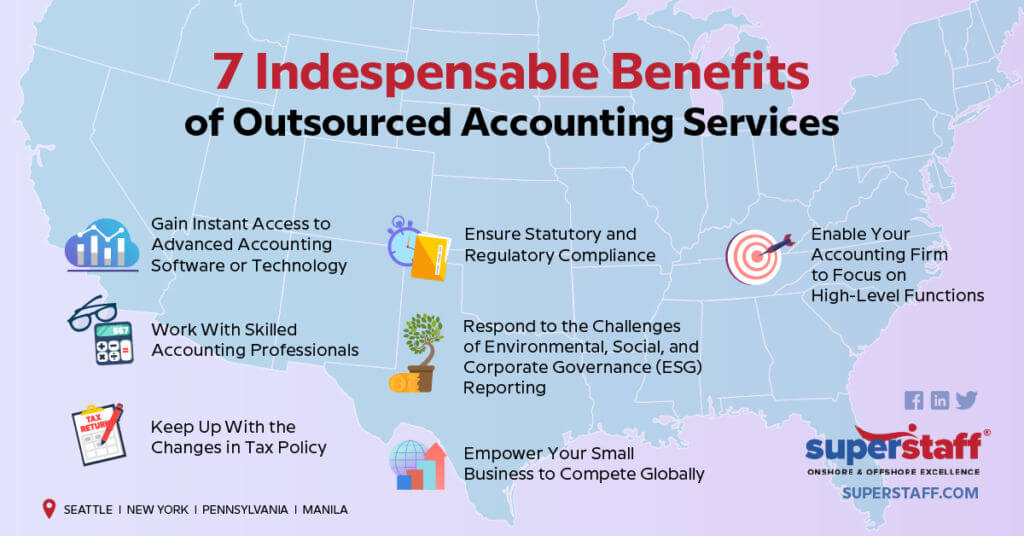
Nearly two years since the COVID-19 prompted a widespread economic halt, companies and financial firms are now starting to pedal their way to recovery. Industry experts foresee that the global accounting services market will reach $573.29 billion in 2021 and grow to $687.7 billion in 2023. To capture emerging opportunities, businesses are restructuring operations and adopting new strategies to capture emerging opportunities. One of which is outsourced accounting services.
Let’s take a closer look at the concept and discover why 8 out of 10 small companies in the U.S. plan to incorporate accounting outsourcing into their business in 2021 and beyond.
What Is Outsourced Accounting Services?
Accounting outsourcing is the practice of assigning one or more tasks related to accounting to an external contractor. It is a common strategy used by businesses of all sizes to reduce costs and support their overwhelmed in-house finance departments.
7 Major Benefits of Outsourced Accounting Services
#1 – Gain Instant Access to Advanced Accounting Software or Technology
Due to the repetitive and time-consuming nature of the processes involved in accounting, industry leaders and professionals have long been dreaming of making digital finance a reality.
The adoption of smart software and cloud computing systems plays an integral role in fulfilling this vision. Automation helps increase speed and efficiency in performing a myriad of accounting tasks. It also minimizes the risks of committing errors that are common to manual accounting.
Despite these benefits, a large population of the finance and accounting sector is still behind in technological adoption. According to a report published by Deloitte:
- 75.7% of survey participants found their company’s accounting processes to involve considerable manual efforts.
- Only 3.6% of respondents said their company had already implemented robotic process automation (RPA).
- Only 1.8% of the participants said their company had already implemented machine learning and artificial intelligence (AI).
There is an understandable reason for the industry’s slow embrace of intelligent technology. For automation to be successful, there should first be a solid implementation of automation in the following foundational fields:
- Cloud-Based Accounting
- Budgeting Forecasting and Reporting
- Data Analytics and Visualization
However, the integration of automation in the said fields requires a major revamp in organizations’ enterprise resource planning systems (ERP)—a direction that comes with a considerable cost. This reason prompts many businesses to outsource accounting services.
As one of the early adopters of intelligent technology, the outsourcing sector offers the financial industry access to its existing technology. This practice eliminates the need to start automation implementation from scratch, allowing businesses to realize significant savings and faster ROI.
#2 – Work With Skilled Accounting Professionals
The digital finance future that CFOs and other industry leaders envision leads to the evolution of the roles of accounting professionals. From taking on specialist accounting tasks, accountants now act as holistic business advisors and vital resources toward realizing digital reality.
In the same study conducted by Deloitte, it was reported that about 44% of companies are looking for professionals with solid technological competencies, particularly in modern accounting and business analytics technologies. However, enterprises all over the world are having challenges finding talents with future-ready skills. Accounting and financial roles ranked 7th in the hardest-to-fill positions in the U.S.
Accounting outsourcing is one way to gain an upper edge in tapping talents with skills relevant to the digital age. Outsourced accounting services firms are up to date with the latest recruitment trends and technologies that enable them to engage accounting proficient and tech-savvy professionals. They are also capable of sourcing top talents from different parts of the world.
#3 – Keep Up With the Changes in Tax Policy
There is a reason why CFOs and business owners dread tax season. Aside from the tiresome and time-consuming paperwork, tax policies also evolve almost every year. The 2021 tax year alone brings more than a handful of changes that include the following:
- Passing of the Consolidated Appropriations Act, 2021
- Planned amendments to Alternative Minimum Tax (AMT)
- Expiration of some provisions in the 2020 CARES Acts
- Increase in marginal tax brackets
Tax liabilities also vary depending on the state where you engage in business. If your company has multiple branches or operations across states, you must triple your efforts to ensure you are updated with tax law changes.
Outsourcing accounting services enables businesses to expand their workforce with professionals who can keep up with tax policy changes. By leaving this function in the hands of accounting outsourcing experts, you can ensure compliance without taking away your focus from your business.

#4 – Ensure Statutory and Regulatory Compliance
Submitting financial and nonfinancial information to governing bodies is not only essential but mandatory. Like tax policies, statutory and regulatory compliance standards virtually change and become more complicated every year. In addition, each industry and state also have their own statutory and regulatory laws.
These challenges put businesses at risk of committing errors that have costly and long-term impacts. To overcome these, many engage an outsourced accounting service provider. Here are some of the specific benefits of outsourcing compliance services:
- Avoid making inadvertent mistakes in preparing statutory and regulatory reports
- Ensure timely adherence to statutory and regulatory guidelines
- Prevent penalties and other legal repercussions related to noncompliance
- Maintain an organized record of related documents and reports
#5 – Respond to the Challenges of Environmental, Social, and Corporate Governance (ESG) Reporting
“Who Cares Wins.” This title of a 2005 study depicts the central message of environmental, social, and corporate governance. ESG is a framework that believes that nonfinancial factors, such as social and environmental impacts, have a bearing on the growth of a business.
In 2020, the influx of investments in ESG funds reached $51.1 billion, twice as much as the recorded amount in 2019. This data reflects how investors, particularly the younger generations, value responsible investing.
The call for companies and financial firms to be environmentally and socially accountable increases the demand for transparency in reporting ESG risks and sustainability portfolio performance.
Accounting outsourcing helps companies and financial institutions to respond to the call. This strategy fills the need for additional human and technical resources to comply with continuously evolving regulations and standards that define sustainability, all while meeting the already complex existing set of metrics they are required to report regularly.
#6 – Empower Your Small Business to Compete Globally
Traditionally, outsourcing was known to be a cost-saving measure employed by multinational corporations. Today, accounting outsourcing is a strategy widely practiced by many small and mid-sized businesses. According to a survey conducted by a B2B rating and review company, 80% of small business owners want to outsource business functions in 2021, and 23% want to outsource accounting services.
Aside from helping small businesses gain significant savings, outsourced accounting services offer multiple benefits that empower small businesses. Some of the advantages of accounting outsourcing are as follows:
- Allows small businesses to work with industry experts who can provide essential accounting guidance to maximize profitability and other opportunities
- Increases efficiency by allowing limited in-house staff to focus on core business functions
- Allows instant access to a wide range of services that otherwise require a considerable investment, including IT support, legal, and human resources
- Enhances flexibility by offering scalable solutions
#7 – Enable Your Accounting Firm to Focus on High-Level Functions
Accounting outsourcing helps supply the expertise that nonfinancial firms lack. But even if accounting is your field of expertise, there are still a lot of benefits you can get from outsourced accounting services. One of which is the luxury to focus on high-level tasks.
Many of the processes involved in accounting are repetitive and time-consuming. These tasks also do not yield higher margins. For instance, bookkeeping can consume over 100 work hours a year. Despite the amount of time it requires to accomplish, bookkeeping is among the least lucrative accounting functions.
Channeling these tasks to an outsourced accounting service provider allows you to maximize the expertise of your internal team on more strategic and revenue-increasing initiatives. This strategy is one way to gain the upper hand against your competitors.
What Are the Best-Outsourced Accounting Services?
#1 – Bookkeeping
A foundational task for accounting, bookkeeping is the process of recording the financial transactions of a business. It is an essential function that enables companies to accurately picture their financial standing and perform financial planning and management. Bookkeeping is also imperative for legal and taxation purposes.
#2 – Payroll Processing
Payroll processing involves the calculation of the compensation of each employee. After extracting details from the employee’s timesheet, the payroll team subtracts withholding taxes, mandatory benefit contributions, and other deductions from the employee’s basic pay to arrive at the net pay.
Payroll processing should align with the guidelines set by regulating bodies, such as the IRS and the Department of Labor, and the standards set by individual states. Therefore, it is paramount that your accounting outsourcing partner of choice has comprehensive knowledge of various payroll processing regulations.
#3 – Accounts Payable
This function involves the management of invoices a business must settle with its suppliers. Accounts payable are usually logged in the company ledger as ‘liabilities.’ Proper accounts payable management is essential to:
- Maintain a healthy cash flow
- Prevent overlooking a payment or paying twice
- Build a good relationship with suppliers
- Improve financial decisions
- Avoid incurring late charges or penalties
The steps involved in accounts payable management vary depending on the volume of payables the enterprise receives. Usually, the bigger the size of the organization, the more complex the process. Below is a typical workflow that most accounts payable departments follow. You can choose to delegate all or some of the steps to an accounting outsourcing provider:
- Invoice Collection and Organization
- Invoice Verification
- Data Entry
- Invoice Processing
- Payment Routing
#4 – Accounts Receivable
Most service and subscription-based businesses collect payments after the service has been rendered. The counterpart of accounts payable, accounts receivables management is the process of ensuring that your business gets paid for the delivery of products or services. This function is integral to ensuring a healthy revenue cycle.
Some of the everyday tasks involved in accounts receivables management are:
- Invoicing
- Payment Tracking
- Client Follow-Ups
- Payment Reconciliation
- Record Maintenance
As a business grows, accounts receivable invoices inevitably pile up as well. This scenario can be avoided by expanding your accounts receivable team. The fastest and most cost-efficient way to achieve this is to partner with a company that offers outsourced accounting services.
#5 – Payrolling
Payrolling is different from payroll processing. When you hire an accounting outsourcing firm for payroll processing, you ask them to manage the processes related to the compensation of employees that your company legally employs. In this setup, the employees are under your payroll.
On the other hand, payrolling is the process of contracting the services of an external firm to augment your workforce, usually on a short-term basis. You do not have to maintain an employer-employee relationship with the outsourced accounting service team in this setup. They are instead considered legal employees and remain under the payroll of the accounting outsourcing company.
Payrolling is ideal for businesses looking to outsource accounting services within a specific timeframe, during tax and compliance seasons.
#6 – Reporting to Authorities and Management
Staying on top of your business requires periodic reviews of your financial statements or reports. Investors also use these reports in gauging the performance and profitability of your business. The most common reports required by authorities and management are:
- Cash Flow Forecasts
- Balance Sheets
- Accounts Receivable and Payable Reports
- Shareholders’ Equity
Depending on the nature and size of the business, financial reports can be brief or comprehensive. It can also be customized according to the specific metrics that you need to analyze. Here are some reasons why many companies find it best to outsource this accounting service:
- Gain access to modern data analytics and reporting software.
- Save a significant amount of time preparing weekly, monthly, quarterly, or annual reports.
- Take advantage of advisory benefits from the experts.
Count on SuperStaff for Accounting Outsourcing
SuperStaff employs certified professionals to help businesses streamline accounting and finance operations. We also utilize the best practices of Fortune 500 companies and invest in advanced accounting software to give our clients a competitive advantage. Contact us today for more information about outsourced accounting services.






